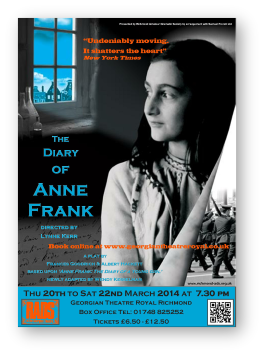



In this powerful new adaptation, Anne Frank emerges from history a living, lyrical, intensely gifted young girl, who confronts her rapidly changing life and the increasing horror of her time with astonishing honesty, wit, and determination. An impassioned drama about the lives of eight people hiding from the Nazis in a concealed storage attic, The Diary of Anne Frank captures the claustrophobic realities of their daily existence—their fear, their hope, their laughter, their grief.
Each day of the two dark years from 1942 to 1944, Anne's voice shines through: “I can shake off everything as I write; my sorrows disappear, my courage is reborn”.
Since its first publication, The Diary of a Young Girl (as Anne Frank's diary was published), has sold over 25 million copies. This extraordinary personal account of hope, courage and survival has united and touched people worldwide.


Report by: Peter Parlour (NODA Rep. District 6) on 24 March 2014
Venue: Georgian Theatre Royal, Richmond
Director: Lynne Kerr
Dreadful reminders of the war were presented by the RADS. The story of the Frank family hiding from the Germans in a secret annex in Amsterdam, and the others living with them was excellently presented. Anne Frank documented her hopes, frustrations and day to-day experiences of confinement in her famous diary which is a personal account of hope and courage charting two years of her life from 1942 to 1944. The set depicted the upstairs rooms of the annex on the small stage.
Anne Frank was excellently portrayed by Freya Mawhinney, (which justifies my decision in giving her a Performance Award last year). There wasn’t a weak part in the cast. Otto Frank, Anne’s father was well played by Bruce Cunningham, and her mother was played by Sue Tandy very well indeed. Anne’s sister Margot was well played by Lauren Cooper, while Otto’s business partner, Mr van Daan, was excellently played by Warnock Kerr. His wife was powerfully played by Ruth Shaw, and their son, Peter, was played by Max Ferguson.
During the play Anne and Peter drew ever closer as friends. They had some friends who kept bringing them provisions in the persons of Mr Kraler, played by Doug Clayton, and Miep Gies, played by Alex Caffrey. They came up from the pit of the stage and made it look as if they were climbing up to the loft. Miep introduced Mr Dussel, again well played by Stuart Kerr, who was a dentist and who had to extract a tooth from Mrs van Daan without any pain killer. All the time they were in hiding they had to be very quiet, and remove their shoes, particularly during the day when workers were downstairs. It really brought home the tragedies the Jews had to put up with. Then at the end the German soldiers came and took them away, eventually to the Gas Chambers.
Anne died of typhus fever at Bergen-Belsen nine months after she was arrested, aged 15yrs old. Otto was the sole survivor of his Family, and inherited the manuscripts. After her death he arranged for the publication of her Diary in 1947. The Society did a very good job in portraying the horrific trials that the Jews had to endure. Very well done Lynne Kerr and the cast.
Reviews















































